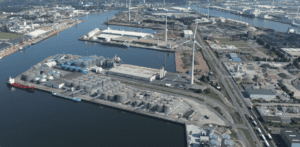North Sea Port helps with the biofuel boom

Five years ago, Zeeland Sea Ports (Vlissingen and Terneuzen) in the Netherlands and the Flemish/Belgian Port of Ghent merged to form a single entity.
North Sea Port became the new brand name of the 60-kilometre-long cross-border Dutch-Flemish facility.
With 73.6 million tons of cargo transshipment from maritime shipping (+7%) and 64.5 million tonnes from inland shipping (+7%) last year, companies operating out of the port experienced their best year since the merger in 2018.
Daan Schalck, CEO of North Sea Port, said: “With another record year, North Sea Port is cementing its position as one of the main ports in Europe.
“That’s pretty remarkable after Brexit, two years of the pandemic, the impact of the Ukraine-Russia war and the energy crisis.”
Its three port areas of Vlissingen (on the North Sea coast), Terneuzen and Ghent (30 km inland) cover an area of 9,100 ha.
The port has been ranked as Europe’s number three in added-value with €12.6 billion generated in 2022. Last year also saw the port reporting 73.6 million tonnes of goods transshipped by sea-going vessel and 64.5 million tonnes by inland transport.
Thanks to its strategic location, the port can accommodate short-sea, deep-sea and inland shipping.
The port’s multimodal network makes it the ideal operating base for shipping goods to all corners of the continent by barge, truck, train or by pipeline.
As one of Europe’s largest industrial clusters, the facility stands at the forefront of the energy transition and the circular and bio-based economy.
For years, the port has been the preferred partner for some of the world’s leading companies in the field of biofuels and gases.


















